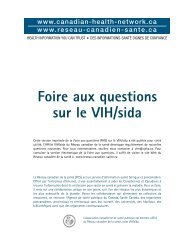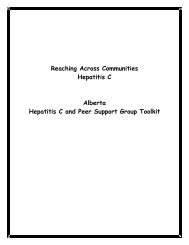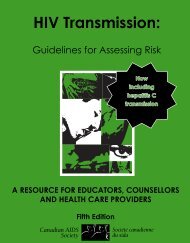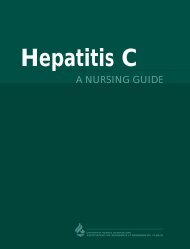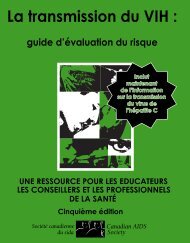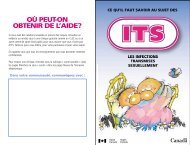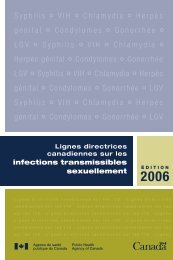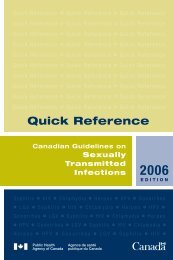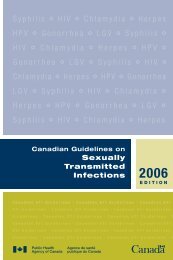A Guide to Primary Care of People with HIV/AIDS - Canadian Public ...
A Guide to Primary Care of People with HIV/AIDS - Canadian Public ...
A Guide to Primary Care of People with HIV/AIDS - Canadian Public ...
Create successful ePaper yourself
Turn your PDF publications into a flip-book with our unique Google optimized e-Paper software.
A <strong>Guide</strong> <strong>to</strong> <strong>Primary</strong> <strong>Care</strong> <strong>of</strong> <strong>People</strong> <strong>with</strong> <strong>HIV</strong>/<strong>AIDS</strong><br />
Chapter 18: Keeping Up-To-Date: Sources <strong>of</strong> Information for the Practicing Clinician<br />
Are <strong>AIDS</strong> conferences useful for providers who<br />
are not <strong>HIV</strong> experts?<br />
A number <strong>of</strong> national conferences provide opportunities<br />
<strong>to</strong> obtain cutting-edge information (see Table 18-1). The<br />
range <strong>of</strong> <strong>of</strong>ferings usually meets the needs <strong>of</strong> providers<br />
just learning about <strong>HIV</strong> as well as providers who are<br />
already <strong>HIV</strong> experts.<br />
What if you practice in a remote area?<br />
In remote geographic areas, the nearest <strong>HIV</strong> expert may<br />
actually be far away and attendance at conferences<br />
and meetings may not be feasible. In this situation,<br />
the regional AETC can be contacted <strong>to</strong> determine<br />
how <strong>to</strong> obtain direct educational programming. When<br />
distance prevents on-site attendance at educational<br />
programs, newer technologies may enable long distance<br />
participation. Satellite broadcasting and down-linking<br />
<strong>to</strong> local facilities may be available and has been a useful<br />
approach in various parts <strong>of</strong> the United States. Distance<br />
learning and web-based information also provide<br />
important sources <strong>of</strong> education when other programming<br />
is unavailable. Many sessions are videotaped or<br />
audiotaped. Videocassettes and audiocassettes may be<br />
distributed or purchased for a modest price.<br />
Is clinical consultation possible even if you are<br />
not affiliated <strong>with</strong> an <strong>HIV</strong> specialty practice?<br />
In areas <strong>of</strong> the country <strong>with</strong> no <strong>HIV</strong> clinical experts, a<br />
number <strong>of</strong> consultative and co-management options<br />
are available through the AETCs or statewide education<br />
initiatives <strong>to</strong> assure that patient care is <strong>of</strong> the highest<br />
quality. Informal discussions <strong>with</strong> experienced providers<br />
in the region are probably the easiest way <strong>to</strong> access<br />
expertise, especially since these providers may be<br />
available for formal clinical consultation when decisions<br />
are made about ART, such as when <strong>to</strong> initiate, modify, or<br />
discontinue therapy.<br />
Clinical consultations are available not only through<br />
the regional AETCs, but also from the National <strong>HIV</strong><br />
Clinical Consultation Center, based at the University <strong>of</strong><br />
California San Francisco (UCSF). This service provides<br />
a “warmline” — a <strong>to</strong>ll-free phone number staffed<br />
from 6:00 a.m. <strong>to</strong> 5:00 p.m. PST by physicians, nurse<br />
practitioners, and pharmacists who are available <strong>to</strong><br />
answer providers’ questions. During other times, or<br />
when the phone line is busy, voicemail messages can<br />
be left and calls returned. The <strong>HIV</strong> experts discuss<br />
options <strong>with</strong> callers, presenting pros and cons <strong>of</strong> various<br />
approaches <strong>with</strong> the goal <strong>of</strong> improving the capability<br />
<strong>of</strong> the provider <strong>to</strong> manage the current situation and<br />
others like it. The Center also refers callers <strong>to</strong> their local<br />
resources for expertise, consultation and training.<br />
National <strong>HIV</strong>/<strong>AIDS</strong> Clinical Consultation<br />
Center Warmline: 1-800-933-3413<br />
WRITTEN RESOURCES<br />
What books and journals are most useful for<br />
primary care providers?<br />
Although a basic textbook <strong>of</strong> <strong>HIV</strong>/<strong>AIDS</strong> medicine<br />
provides a basic reference <strong>of</strong> core knowledge, it becomes<br />
outdated nearly as quickly as it is published, particularly<br />
in relation <strong>to</strong> ART. Small books such as the Pocket <strong>Guide</strong><br />
included in this guide contain quick reference materials,<br />
are more frequently updated, and provide summaries<br />
that can be useful at the point <strong>of</strong> care. Other books<br />
provide specialized information related <strong>to</strong> the care <strong>of</strong><br />
specific groups <strong>of</strong> persons <strong>with</strong> <strong>HIV</strong>. For example, A<br />
<strong>Guide</strong> <strong>to</strong> the Clinical <strong>Care</strong> <strong>of</strong> Women <strong>with</strong> <strong>HIV</strong> <strong>of</strong>fers an<br />
excellent comprehensive overview <strong>of</strong> issues pertaining <strong>to</strong><br />
the care <strong>of</strong> women, <strong>with</strong> useful tables, pho<strong>to</strong>graphs, and<br />
practical information for the provider.<br />
Most major journals include articles about <strong>HIV</strong>. Clinical<br />
trials and review articles periodically appear in the<br />
major internal medicine journals. Two important peerreviewed<br />
<strong>HIV</strong>-specific journals, <strong>AIDS</strong> and J<strong>AIDS</strong> (Journal<br />
<strong>of</strong> the Acquired Immune Deficiency Syndromes and Human<br />
Retrovirology), include studies and review articles in the<br />
domains <strong>of</strong> basic science, epidemiology, clinical care,<br />
and <strong>HIV</strong> prevention. Other regularly published bulletins<br />
and journals <strong>of</strong>fer review articles on basic aspects <strong>of</strong><br />
clinical management that are useful summaries for the<br />
primary <strong>HIV</strong> care provider. The Johns Hopkins <strong>HIV</strong> Report<br />
provides summaries <strong>of</strong> current issues and controversies<br />
in <strong>HIV</strong> care authored by experts from the Hopkins <strong>HIV</strong><br />
Service. Question and answer sessions <strong>with</strong> experts<br />
are <strong>of</strong>ten included as part <strong>of</strong> these publications. See<br />
Table 18-2 for a list <strong>of</strong> recommended publications.<br />
Also, a comprehensive list <strong>of</strong> <strong>HIV</strong> pr<strong>of</strong>essional journals<br />
can be found at http://www.mednets.com/index.cfm/<br />
fuseaction/articles_aids_aidsjournals Accessed 3/04.<br />
Can journal articles be accessed on the internet?<br />
To keep up <strong>with</strong> all <strong>of</strong> the <strong>HIV</strong> journals is impossible,<br />
especially when a practice is not exclusively devoted<br />
<strong>to</strong> <strong>HIV</strong> care. Several websites post information about<br />
newly published articles and can easily be scanned <strong>to</strong><br />
seek relevant or noteworthy information (see Table 18-<br />
3). Medscape, which has a specific section dedicated <strong>to</strong><br />
<strong>HIV</strong>, and <strong>HIV</strong>InSite are two good sources <strong>of</strong> news. An<br />
abstract <strong>of</strong> almost any article can be retrieved through<br />
the National Library <strong>of</strong> Medicine’s website at PubMed.<br />
A useful list <strong>of</strong> websites, references and news may also<br />
be found at Medline Plus. The Kaiser Daily <strong>HIV</strong>/<strong>AIDS</strong><br />
Report <strong>of</strong>fers a daily news summary that includes<br />
both newspaper articles and major clinical or scientific<br />
releases that anyone can subscribe <strong>to</strong> by registering at<br />
the website. The Aegis website links <strong>to</strong> news summaries<br />
that can be quickly accessed <strong>to</strong> obtain the desired<br />
summary.<br />
18<br />
U.S. Department <strong>of</strong> Health and Human Services, Health Resources and Services Administration, <strong>HIV</strong>/<strong>AIDS</strong> Bureau<br />
151



